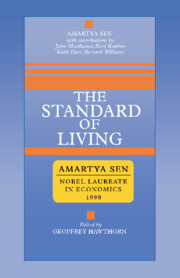Book contents
- Frontmatter
- Contents
- List of contributors
- Introduction
- The Standard of Living: Lecture I, Concepts and Critiques
- The Standard of Living: Lecture II, Lives and Capabilities
- Professor Sen on the Standard of Living
- The Standard of Living: Uncertainty, Inequality and Opportunity
- Commoditisation and the Standard of Living
- The Standard of Living: Interests and Capabilities
- Reply
- Bibliography
- Index
The Standard of Living: Uncertainty, Inequality and Opportunity
Published online by Cambridge University Press: 23 December 2009
- Frontmatter
- Contents
- List of contributors
- Introduction
- The Standard of Living: Lecture I, Concepts and Critiques
- The Standard of Living: Lecture II, Lives and Capabilities
- Professor Sen on the Standard of Living
- The Standard of Living: Uncertainty, Inequality and Opportunity
- Commoditisation and the Standard of Living
- The Standard of Living: Interests and Capabilities
- Reply
- Bibliography
- Index
Summary
INTRODUCTION
Upon the fairest prospects of earthly happiness, attend uncertainty and mischance
Epitaph in Madingley churchIf it is hard to think of an idea more immediate than that of the living standard, it must be equally hard to think of a phenomenon more pervasive than that of uncertainty. As Arrow (1971) has noted, almost every aspect of economic life, and life in general, is influenced by uncertainty. How, then, does the presence of uncertainty affect the conceptualisation of the standard of living? This is the question to which these comments are addressed. I am only able to touch upon a limited number of issues and will focus attention on some key points raised in Sen's lectures.
At the core of Sen's first lecture is a critique of utility-based views of the standard of living. In terms of what he calls the competitive plurality of views on the standard of living, the utility approach is clearly rejected by Sen. In his second lecture Sen goes on to develop an alternative line of argument whose culmination is the advocacy of what is termed the capability approach to the standard of living. However, as Sen is well aware, there are several issues that still have to be sorted out in terms of the constitutive plurality of this approach. As we shall see, uncertainty considerations impinge upon both the competitive and the constitutive plurality of views in the standard of living.
- Type
- Chapter
- Information
- Tanner Lectures in Human ValuesThe Standard of Living, pp. 59 - 69Publisher: Cambridge University PressPrint publication year: 1987
- 5
- Cited by

